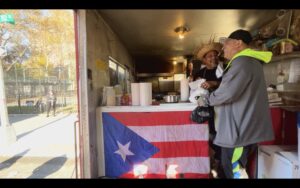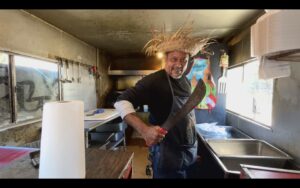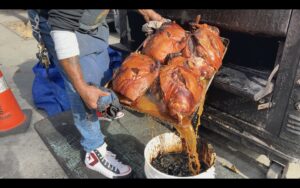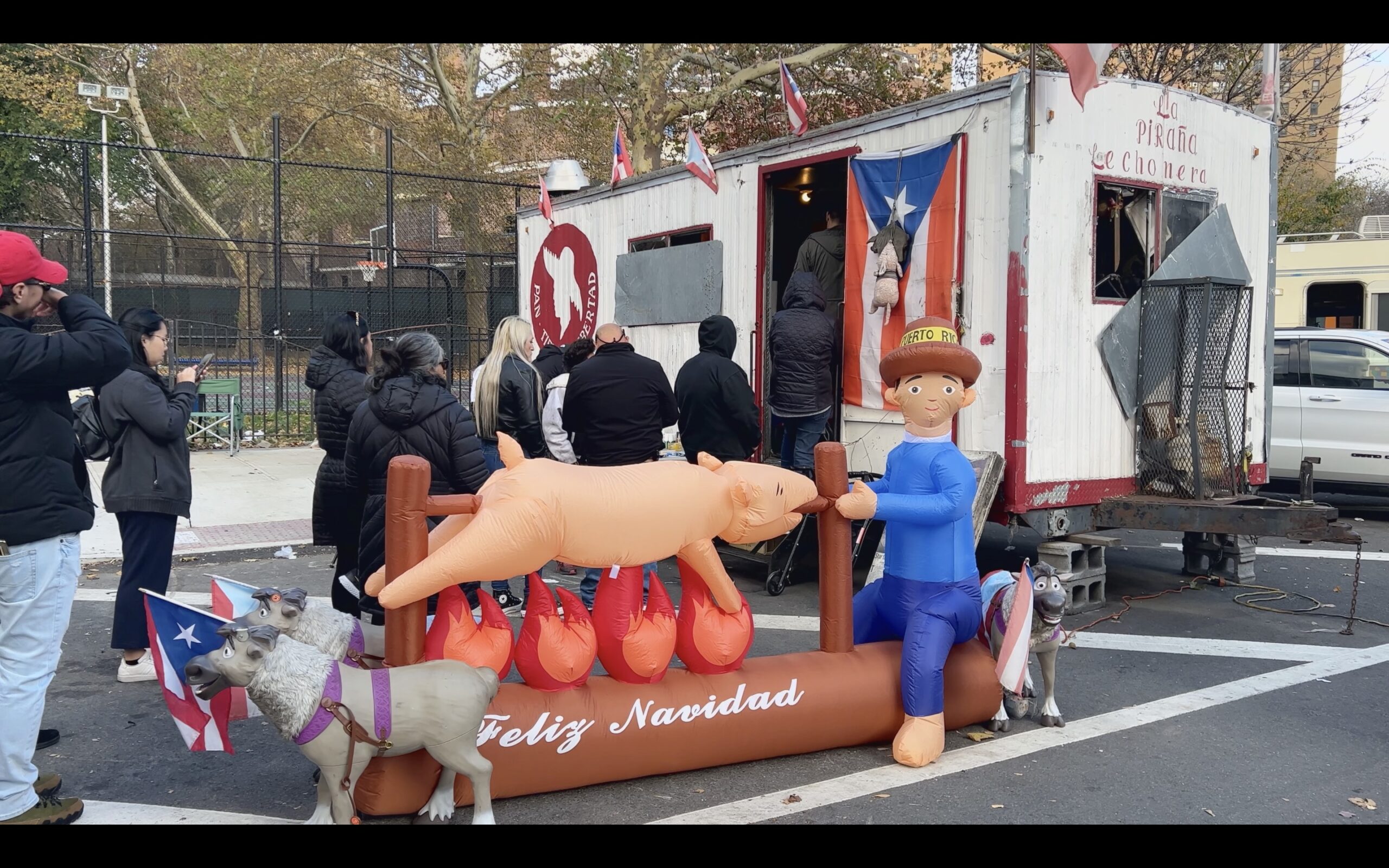Every weekend afternoon, people begin lining up down an entire block in Melrose. They’re waiting to step into a trailer where Angel Jimenez is skillfully swinging a machete at a huge piece of pork – what some say is the best Puerto Rican-style pork in New York.
This is La Piraña Lechonera, a food “truck” at the corner of Wales Avenue and East 152nd Street. Jimenez has been serving his famous lechon asado, or slow-roasted pork, and other Puerto Rican dishes here for over 20 years.
La Piraña has been well known to South Bronx locals and New York foodies “in the know” for some time. It was one of five finalists in the 2014 NYC Vendy Cup Awards, which recognizes the best street food in the city. That got the attention of media outlets like Vice, Grub Street, Eater, and the TV show Bizarre Foods with Andrew Zimmern. But its recognition as a major player in the city’s culinary scene came just last year.
In June 2022, famed New York Times food critic Pete Wells gave La Piraña three out of four stars, meaning excellent, but not quite extraordinary. It’s the paper’s only three-star restaurant in the “inexpensive” category, represented by one dollar sign out of four possible.
“When you meet people like that, it’s a blessing,” said Jimenez, who did not know who Wells was when he tried his food. “I treat him right, I talk to him nice, and do the right thing. And he decided to put me out there. So for me, it’s a blessing. It give me the push that I need.”
Then in April this year, Wells released a ranking of the 100 best restaurants in New York City. La Piraña was ranked #5, just behind fine-dining Manhattan restaurants like Le Bernardin and Tatiana, helmed by world-renowned chefs and notorious for their exclusive reservation lists.

If you ask Jimenez, who runs his restaurant by himself, you don’t need white tablecloths and polished silverware to be among the best. All you need to do is “keep it real” and know how to cook.
“I don’t have to talk. My food talks for itself,” said Jimenez.
He learned how to cook from his grandparents and parents in Aguadilla, the Puerto Rican beach town where he grew up. He got the nickname “piraña” because he was always swimming in the water. His father, a fisherman, eventually opened a lechonera, a type of restaurant that primarily sells roast pork on a spit.
His parents then moved the family to the South Bronx in 1984 and continued the lechonera out of the back of a truck. Jimenez took over when they passed and he expanded the kitchen space with a trailer.
As he finished prepping food an hour before opening one Saturday in November, early customers came by to chat with Jimenez, raising their voices over the blaring salsa music.
”That special touch that he has that brings you back to the island is beautiful,” said Kimberly Franqui, a local who was enjoying a laugh with Jimenez. Also from Aguidilla, she found out about La Piraña on TikTok around two years ago. She said she has not found Puerto Rican food like it anywhere else.
“I’ve been to many restaurants and it doesn’t taste the same. At all,” said Franqui, who appreciates that Jimenez cooks the lechon the old-school way: leña, or over firewood.

Another customer handed him a bottle of Heineken.
“This is my gasolina,” said Jimenez with a smile.
He splashed some of the beer on the trailer floor in honor of his parents before guzzling down the rest.
“They show me the way, who I am,” he continued. “I do this to bless them. To keep going with the same tradition.”
Jimenez used to have a menu painted on the trailer door, but removed it recently since his offerings are subject to change day by day. He often has pulpo, a refreshing octopus salad made with peppers, onions, olives, and lots of Goya olive oil.
“Everything is Goya,” said Jimenez, pointing to other cans and containers in the kitchen. “This is the real deal. The taste. Grandma’s backyard. Papi’s backyard. Mami’s backyard, you know what I’m saying? That’s the way we grew up, so we never change it.”
On this Saturday, he’s also serving boiled green plantains and stewed shrimp, but other days he might have mofongo, tostones, or Puerto Rican empanadas known as pastelillos. All of it can be covered in his homemade mojo de ajo (garlic sauce) and pique (hot sauce).
But he always has the lechon, the main attraction. The cooking process starts on Friday night when Jimenez buys two whole pigs and seasons them with a dry rub containing adobo, oregano, and more spices. The rest is a family secret. He hangs the pigs to dry in his garage until he’s ready to start cooking – at 4 am.
Lechon is traditionally cooked on a spit, but Jimenez has to work with a wood-fired outdoor oven down the street from the trailer. Every part of the pig except the head slowly roasts at around 300 degrees for the next eight hours, resulting in moist and tender meat dripping with fat and an impressively crunchy, caramelized skin.
Jimenez took out a tray of ribs from the oven, grunting his approval, and poured a stream of released pork fat into a bucket (which a local company will later take to make soap). He scraped the edge of a knife over the skin to confirm it had transformed into a hard, glassy shell, then carried it toward the line of waiting customers who oohed and aahed and whipped out their phones to take pictures.
Jimenez brought the ribs into the trailer and sharpened his machete, the traditional knife used for its ability to cut through bone like butter. With hard and fast chops that can be heard down the street, he sent bits of lechon flying around the kitchen before packing the meat into to-go containers with a heaping mound of arroz con gandules, or rice and pigeon peas.
Since Wells’ review, business has been better than ever, according to Jimenez, with people coming from all over the Northeast and beyond to try his food. He listed a few of the travelers he’s met off the top of his head: Californians, Arizonans, even Canadians. The media attention has also made the line longer than ever, but locals and repeat customers know to get there early.
La Piraña is only open on Saturdays and Sundays from 12:30 pm until the pork runs out, which is usually around 6 pm. Jimenez has a full time job during the week working on boilers and air conditioning units. He said he can’t retire yet because he has nine kids to feed.
But the dream has always been to open a brick and mortar restaurant, which is “happening soon,” he said cryptically.

Part of the charm of La Piraña is Jimenez himself, who is known for his warm attitude and infectious joy, no matter how busy and chaotic it gets in the trailer. Everyone who steps inside is treated like family, because Jimenez says he cooks to show people where he comes from.
“When I was young, I was dressed like this, you know, with no shoes on. I don’t have nothing,” said Jimenez.
“If a homeless guy come over here asking me for food, I say, ‘can you give me one minute,’ and I give him whatever I got,” he said. ‘God bless me, open the door for me, so I like to help people, too. Because God give me something that I need to make my dream come true.”

